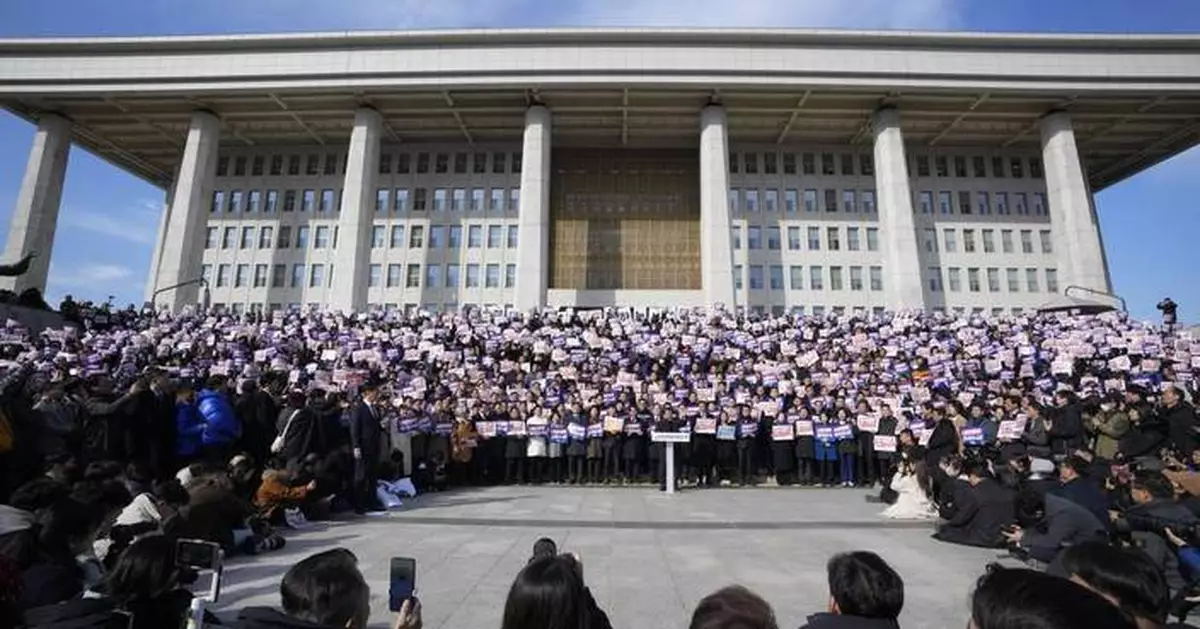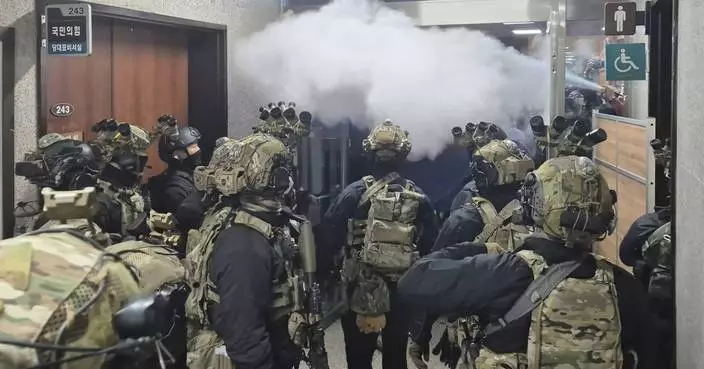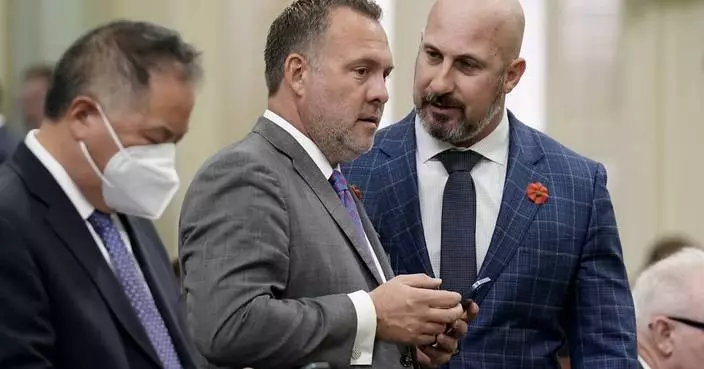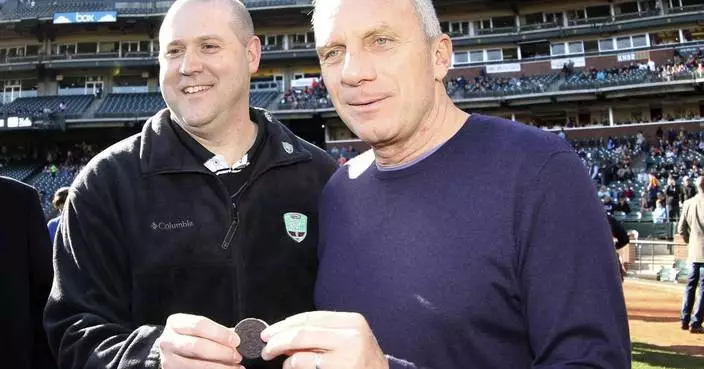TOKYO (AP) — It may seem that the wild predawn scenes in Seoul, with hundreds of armed troops and frantic lawmakers storming South Korea's parliament building after the president suddenly declared martial law, came out of nowhere.
But the chaotic events, which were still playing out Wednesday as opposition leaders introduced an impeachment motion and called for President Yoon Suk Yeol's immediate resignation, should be seen in the context of South Korea's recent tumultuous political and social history.
These moments resonate with South Koreans in their daily lives, and as they look to explain Yoon's short-lived declaration of emergency martial law, even if there's still widespread confusion and anger over his decision.
From a nationwide doctors' strike, to an opposition leader narrowly avoiding prison amid a raft of court cases, to millions of people filling the streets in protest to drive out an elected leader, here is a look at some of those recent crucial developments.
For months, it has been health, not politics, that has been a major focus of many South Koreans.
An extended strike by thousands of junior doctors who have refused to see patients or attend surgeries has disrupted operations at hospitals across the country.
The strife is especially acute in a nation facing a major demographic crisis. South Korea has one of the fastest aging, fastest shrinking populations in the developed world. There is hardly a family that has not struggled with medical care for loved ones.
The strike, which is ongoing, began Feb. 20 in response to a government push to recruit more medical students.
Yoon’s government has taken a hard line, warning that doctors must return to work or face license suspensions and prosecutions. He has said the strike poses “a grave threat to our society.”
At issue is the government plan to raise South Korea’s annual medical school admission cap by 2,000 from the current 3,058. The enrollment plan is meant to add up to 10,000 doctors by 2035 to cope with the country’s fast-aging population. Officials say South Korea has 2.1 physicians per 1,000 people — far below the average of 3.7 in the developed world.
The striking doctors-in-training predict that doctors in greater competition would overtreat patients, increasing public medical expenses. Some critics say the striking junior doctors simply oppose the government plan because they believe adding more doctors would result in lower incomes.
Investigations and legal proceedings against major political figures are common in South Korea. Almost all former presidents, or their family members and key associates, have been mired in scandals near the end of their terms or after they left office.
The current opposition leader, Lee Jae-myung, a firebrand liberal who narrowly lost the 2022 election to Yoon, has also been dogged by corruption claims.
Lee, who was stabbed in an attack and underwent surgery earlier this year, says Yoon's promotion of divisive politics has worsened an already toxic national discourse.
Last month Lee was convicted of violating election law and sentenced to a suspended prison term for making false statements during a presidential campaign. He faces three other trials over corruption and other criminal charges.
It remains unclear whether the Supreme Court will decide on any of the cases before the next presidential vote in March 2027.
Lee has steadfastly denied wrongdoing.
It’s unclear, of course, how events in coming days will play out, but the martial law declaration could be a boon to Lee, especially if it results in an early exit for Yoon and a presidential by-election.
On Wednesday, he livestreamed himself climbing over a wall near parliament, one of a wave of lawmakers who dodged troops and police to get into the National Assembly.
Perhaps the most epochal event in recent South Korean political history — and the one many people will be thinking of as Yoon faces the consequences of his declaration — was the downfall of conservative former President Park Geun-hye.
After near-daily protests in 2016 that saw millions take to the streets around the country, Park was the first democratically elected leader to be forced from office since democracy came to South Korea in the late 1980s.
Park, who was pardoned in late 2021 by her liberal rival and successor, former President Moon Jae-in, was serving a lengthy prison term for bribery and other crimes.
Park, the daughter of assassinated dictator Park Chung-hee, won election as South Korea’s first female president in late 2012 by beating Moon by a million votes. Conservatives celebrated her father as a hero who pulled the country up from postwar poverty despite his suppression of human rights.
She was impeached by lawmakers in late 2016 and was formally removed from office and arrested the following year.
Among the main charges she faced was collusion with her longtime confidante, Choi Soon-sil, to take millions of dollars in bribes and extortion from some of the country’s largest business groups, including Samsung, while she was in office.
Park has described herself as a victim of political revenge.
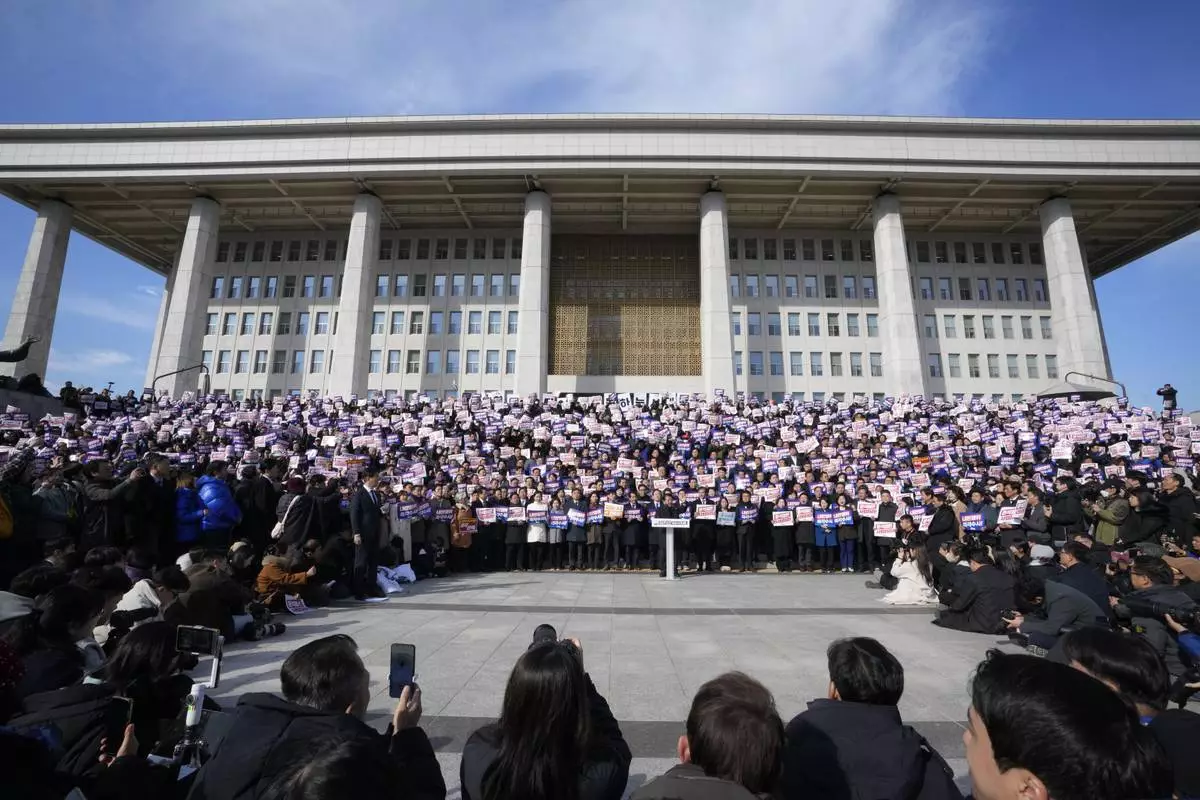
Members of main opposition Democratic Party stage a rally against South Korean President Yoon Suk Yeol at the National Assembly in Seoul, South Korea, Wednesday, Dec. 4, 2024. (AP Photo/Ahn Young-joon)
TOKYO (AP) — South Korea's President Yoon Suk Yeol faced parliamentary moves to impeach him after he sent heavily armed troops into Seoul's streets with his baffling and sudden declaration of martial law that harkened to the country’s past dictatorships.
Opposition parties submitted the impeachment motion just hours after parliament unanimously voted to cancel Yoon's declaration, forcing him to lift martial law about six hours after it began. Impeaching Yoon requires the support of two-thirds of the National Assembly and at least six of the nine Constitutional Court justices. The liberal opposition Democratic Party holds a majority in the 300-seat parliament and has called for Yoon's resignation.
A vote on impeachment motion could be as early as Friday, Democratic Party lawmaker Kim Yong-min said.
During the tense and shocking hours under martial law, heavily armed special operations forces surrounded the parliament, backed by army helicopters and armored vehicles. Lawmakers climbed walls to get into the building and held off troops by activating fire extinguishers. Politician and former news anchor Ahn Gwi-ryeong tried to pull away an assault rifle a soldier had pointed at her chest as she shouted: “Aren’t you ashamed of yourselves?”
The lawmakers who managed to reenter the building rejected Yoon’s martial law declaration 190-0, including 18 lawmakers from Yoon’s party, forcing Yoon to rescind it at a hastily assembled Cabinet meeting.
Here’s what to know about the situation in South Korea:
Yoon ordered martial law without warning in a speech late Tuesday where he vowed to eliminate “anti-state” forces he said were plotting rebellion and accused the main opposition parties of supporting the country’s rival, North Korea.
Yoon gave no direct evidence when he raised the specter of North Korea as a destabilizing force. Yoon has long maintained that a hard line against the North is the only way to stop Pyongyang from following through on its nuclear threats against Seoul.
In the late 1980s, South Korea had a series of strongmen who repeatedly invoked North Korea when struggling to control domestic dissidents and political opponents.
Yoon has struggled to get his agenda through an opposition-dominated parliament while corruption scandals involving him and his wife.
The opposition lambasted Yoon's actions as undemocratic. Opposition leader Lee Jae-myung, who narrowly lost to Yoon in the 2022 presidential election, called Yoon’s announcement “illegal and unconstitutional.”
The sudden declaration was also opposed by the leader of Yoon's own conservative party, Han Dong-hoon, who called the decision wrong and vowed to “stop it with the people.”
“The people will block the president’s anti-constitutional step. The military must be on the side of the public in any case. Let’s resolutely oppose it,” Kim Dong Yeon, the opposition party governor of Gyeonggi province, which surrounds Seoul, wrote on X.
Average South Koreans were in shock. Social media was flooded with messages expressing surprise and worry over Yoon’s announcement.
There were quick claims that the emergency declaration was linked to Yoon’s political struggles.
He has had little success in getting his policies adopted by a parliament that has been controlled by the opposition since he took over in 2022.
Conservatives have said the opposition moves are political revenge for investigations into Lee, who is seen as the favorite for the next presidential election in 2027.
Just this month, Yoon denied wrongdoing in an influence-peddling scandal involving him and his wife. The claims have battered his approval ratings and fueled attacks by his rivals.
The scandal centers on claims that Yoon and first lady Kim Keon Hee exerted inappropriate influence on the conservative ruling People Power Party to pick a certain candidate to run for a parliamentary by-election in 2022 at the request of Myung Tae-kyun, an election broker and founder of a polling agency who conducted free opinion surveys for Yoon before he became president.
Yoon has said he did nothing inappropriate.
South Korea became a democracy only in the late 1980s, and military intervention in civilian affairs is still a touchy subject.
During the dictatorships that emerged as the country rebuilt from the 1950-53 Korean War, leaders occasionally proclaimed martial law that allowed them to station combat soldiers, tanks and armored vehicles on streets or in public places to prevent anti-government demonstrations.
Such scenes are unimaginable for many today.
Dictator Park Chung-hee, who ruled South Korea for nearly 20 years before he was assassinated by his spy chief in 1979, led several thousand troops into Seoul in the early hours of May 16, 1961, in the country’s first coup. He proclaimed martial law several times to stop protests and jail critics.
Less than two months after Park’s death, Maj. Gen. Chun Doo-hwan led tanks and troops into Seoul in December 1979 in the country’s second coup. The next year, he orchestrated a brutal military crackdown on a pro-democracy uprising in the southern city of Gwangju, killing at least 200 people.
In the summer of 1987, massive street protests forced Chun’s government to accept direct presidential elections. His army buddy Roh Tae-woo, who had joined Chun’s 1979 coup, won the election held later in 1987 thanks largely to divided votes among liberal opposition candidates.
AP writers Kim Tong-hyung and Hyung-jin Kim in Seoul, South Korea, contributed to this story.
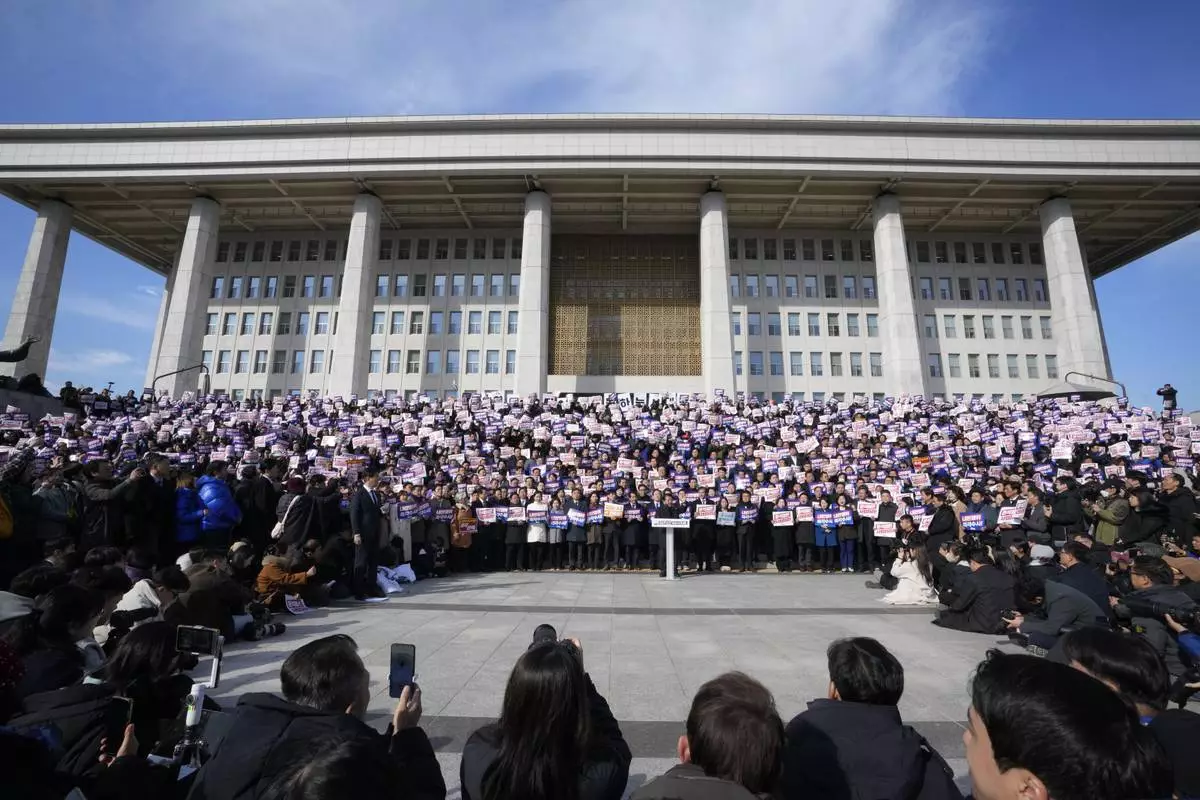
Members of main opposition Democratic Party stage a rally against South Korean President Yoon Suk Yeol at the National Assembly in Seoul, South Korea, Wednesday, Dec. 4, 2024. (AP Photo/Ahn Young-joon)
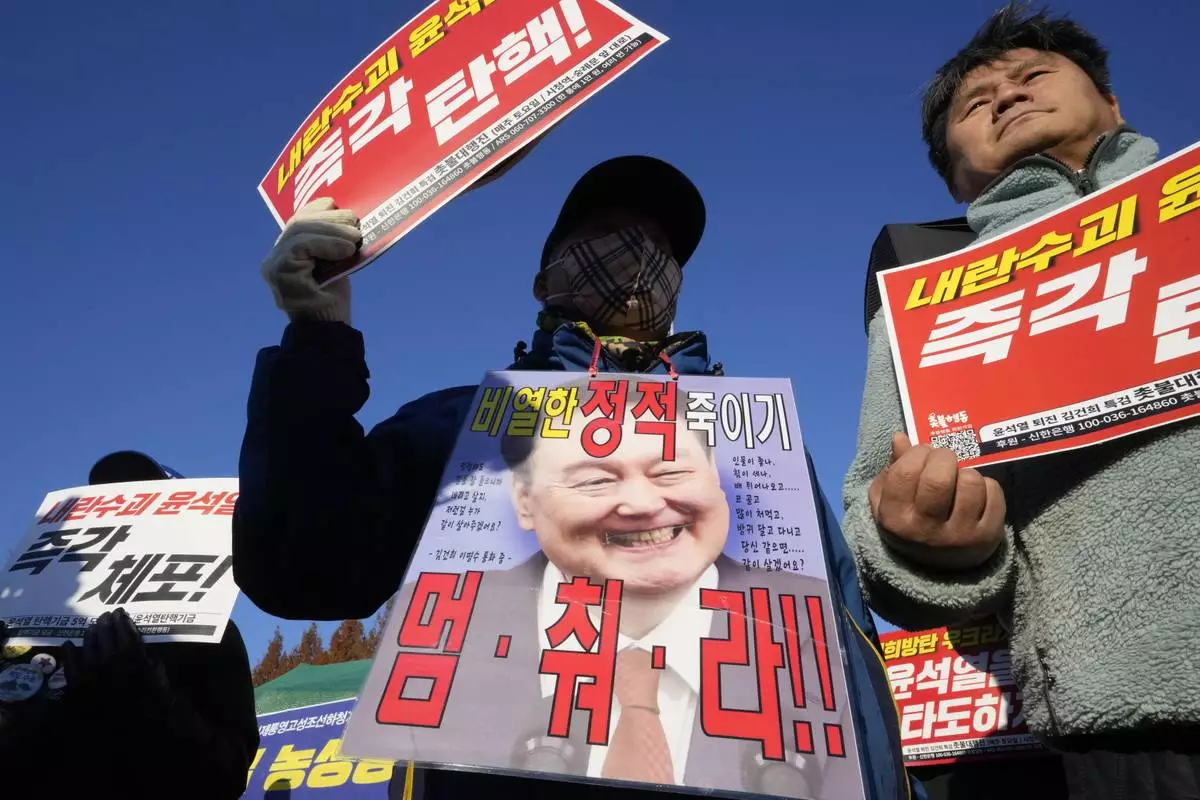
Protesters attend a rally to demand South Korean President Yoon Suk Yeol to step down in front of the National Assembly in Seoul, South Korea, Wednesday, Dec. 4, 2024. The signs read "Stop." (AP Photo/Ahn Young-joon)
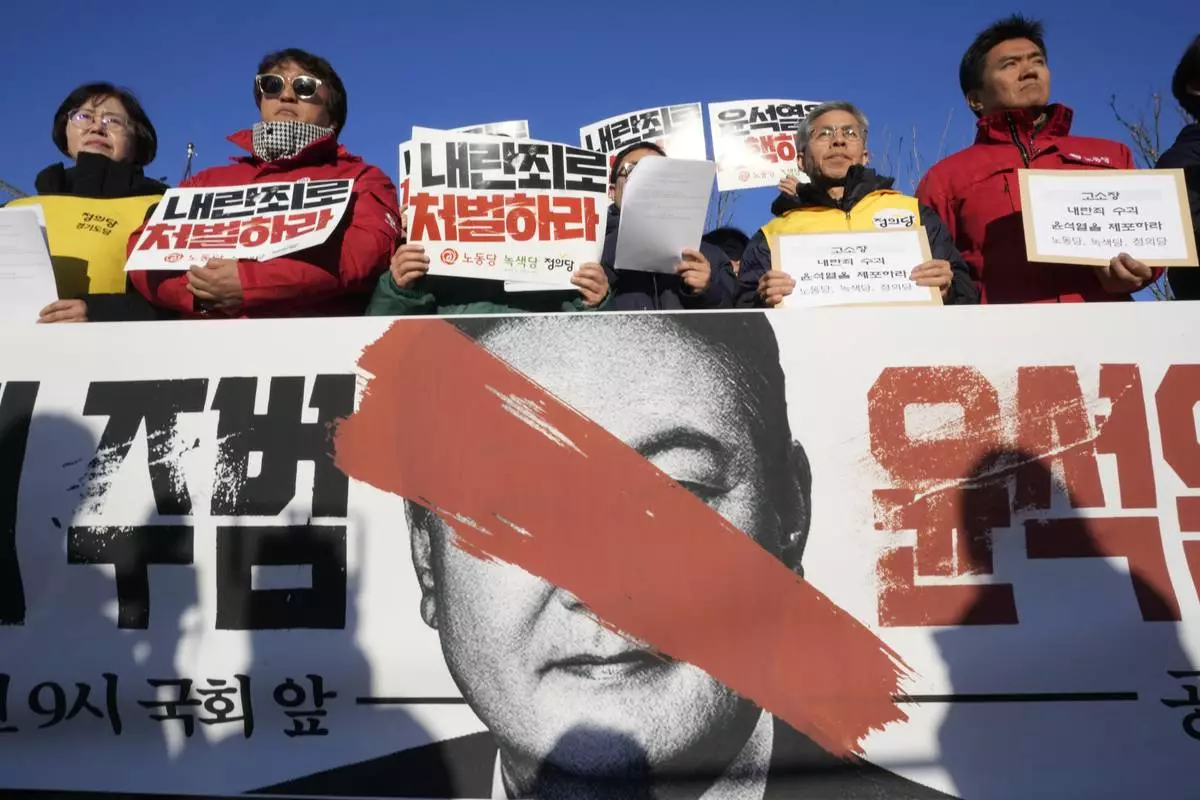
Protesters stage a rally to demand South Korean President Yoon Suk Yeol to step down in front of the National Assembly in Seoul, South Korea, Wednesday, Dec. 4, 2024. The signs read "Punish." (AP Photo/Ahn Young-joon)
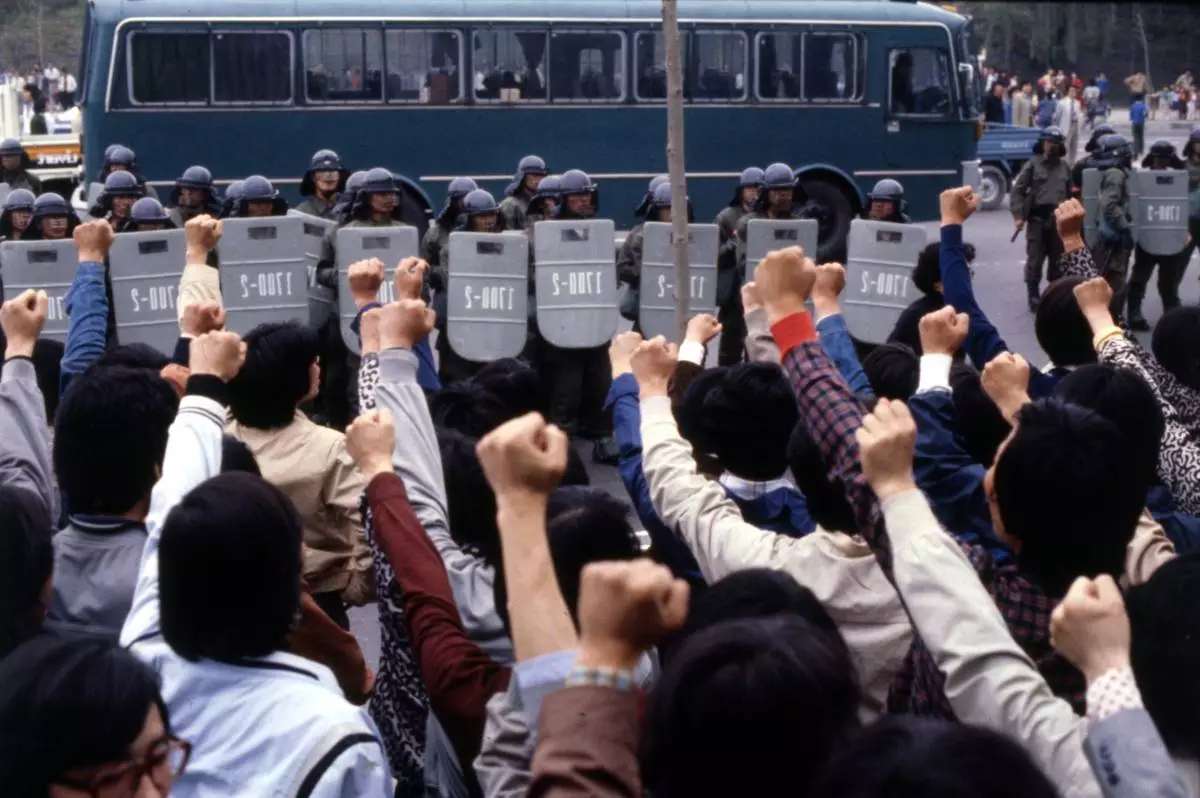
FILE - Mass students demonstrators demand the lifting of martial law and the resignation of Premier Shin Hyon-Hwack and Korean Central Intelligence chief Lt. Gen. Chun Doo-Hwan, in May 1980. (AP Photo, File)
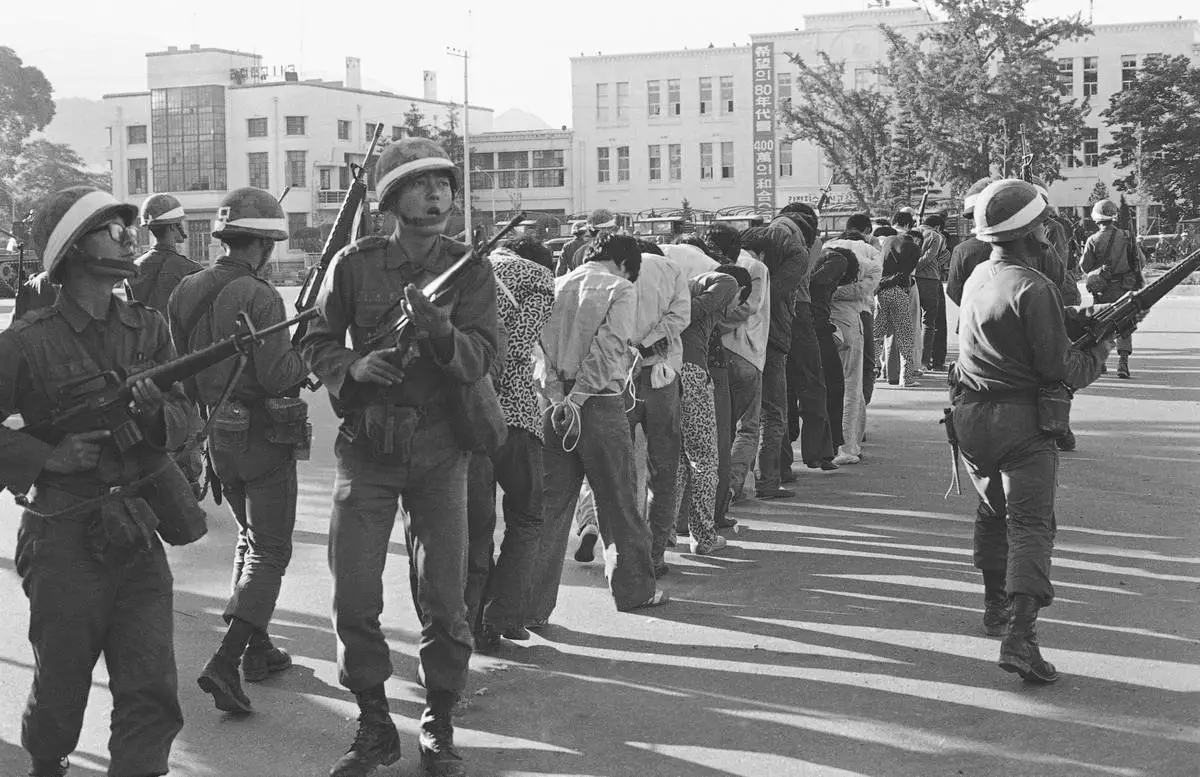
FILE - Armed South Korean government martial law troops guard captured rebels in Gwangju (Kwangju), South Korea, on May 27, 1980. The rebels were rounded up following the government's recapture by the riot-battered city. (AP Photo/Sadayuki Mikami, File)
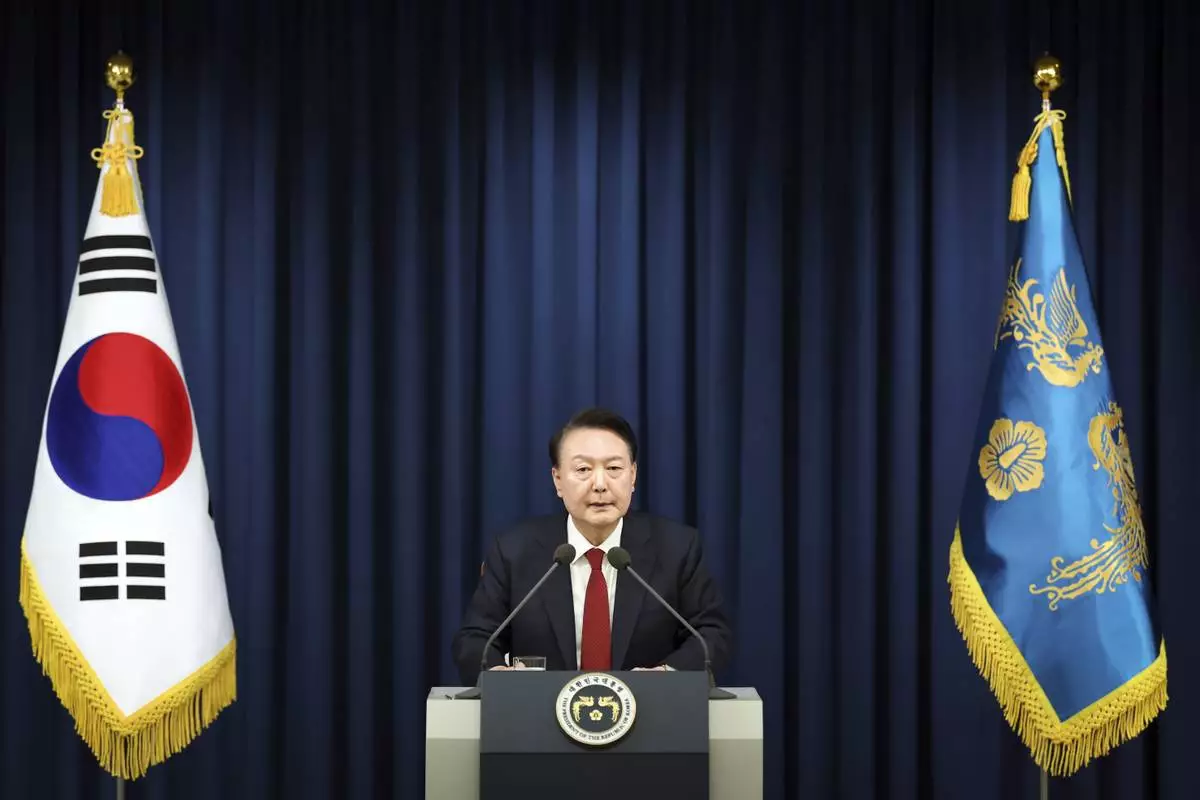
In this photo provided by South Korea Presidential Office, South Korean President Yoon Suk Yeol speaks during a press briefing at the presidential office in Seoul, South Korea, Tuesday, Dec. 3, 2024. (South Korea Unification Ministry via AP).
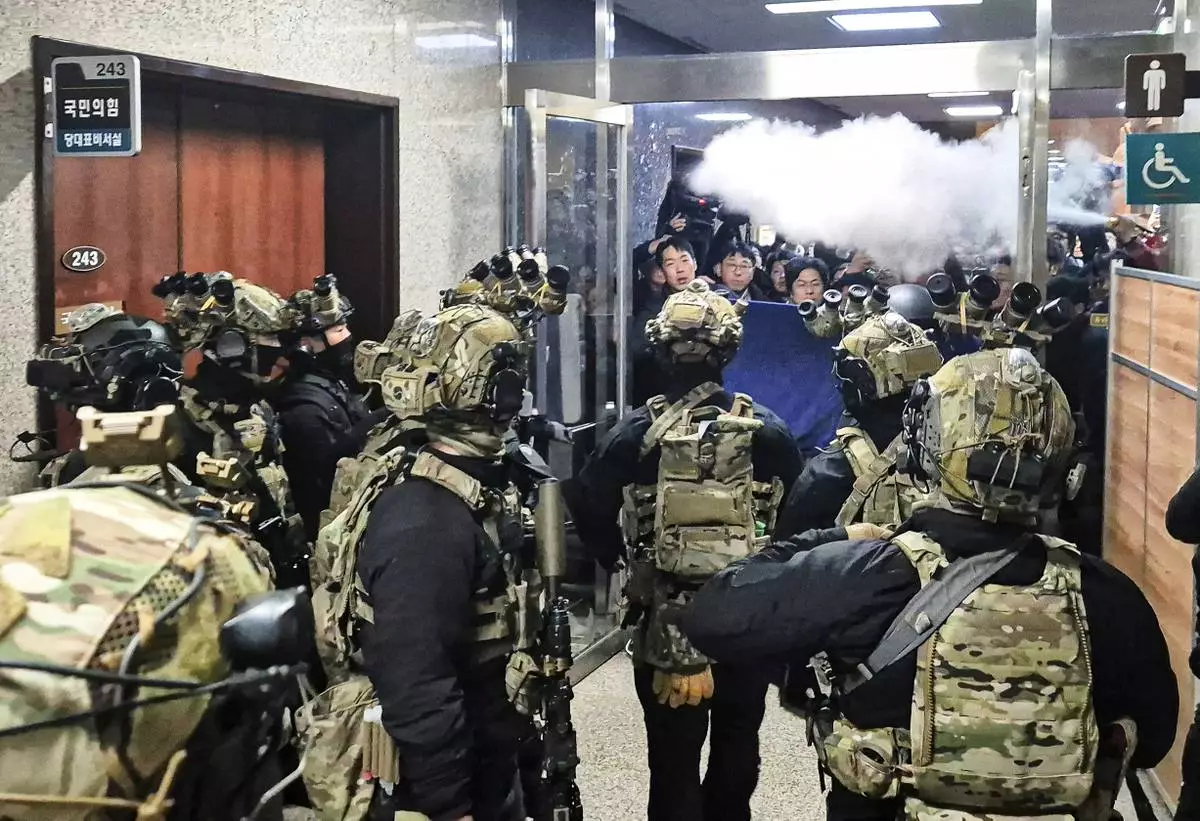
A National Assembly staff sprays fire extinguishers to block soldiers entering the main hall of the National Assembly in Seoul, South Korea, Wednesday, Dec. 4, 2024. (Jo Da-un/Yonhap via AP)
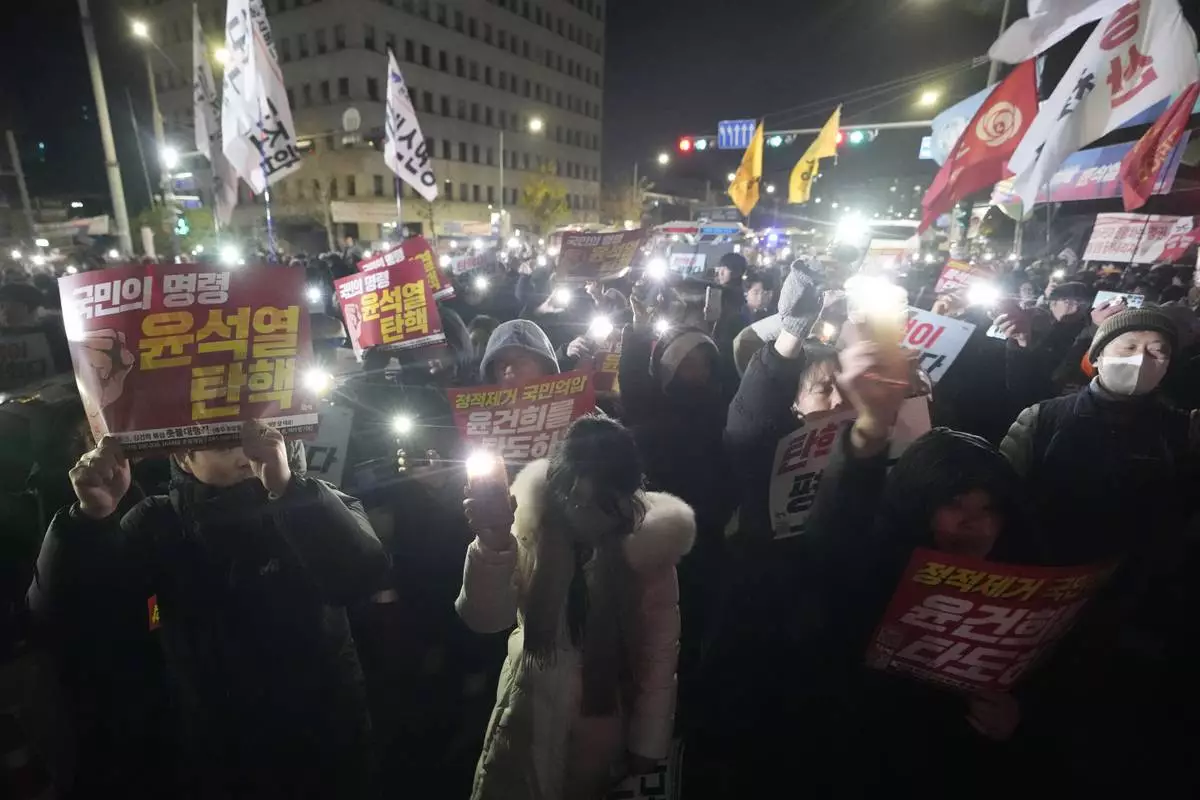
People gather to demand South Korean President Yoon Suk Yeol to step down in front of the National Assembly in Seoul, South Korea, Wednesday, Dec. 4, 2024. (AP Photo/Ahn Young-joon)
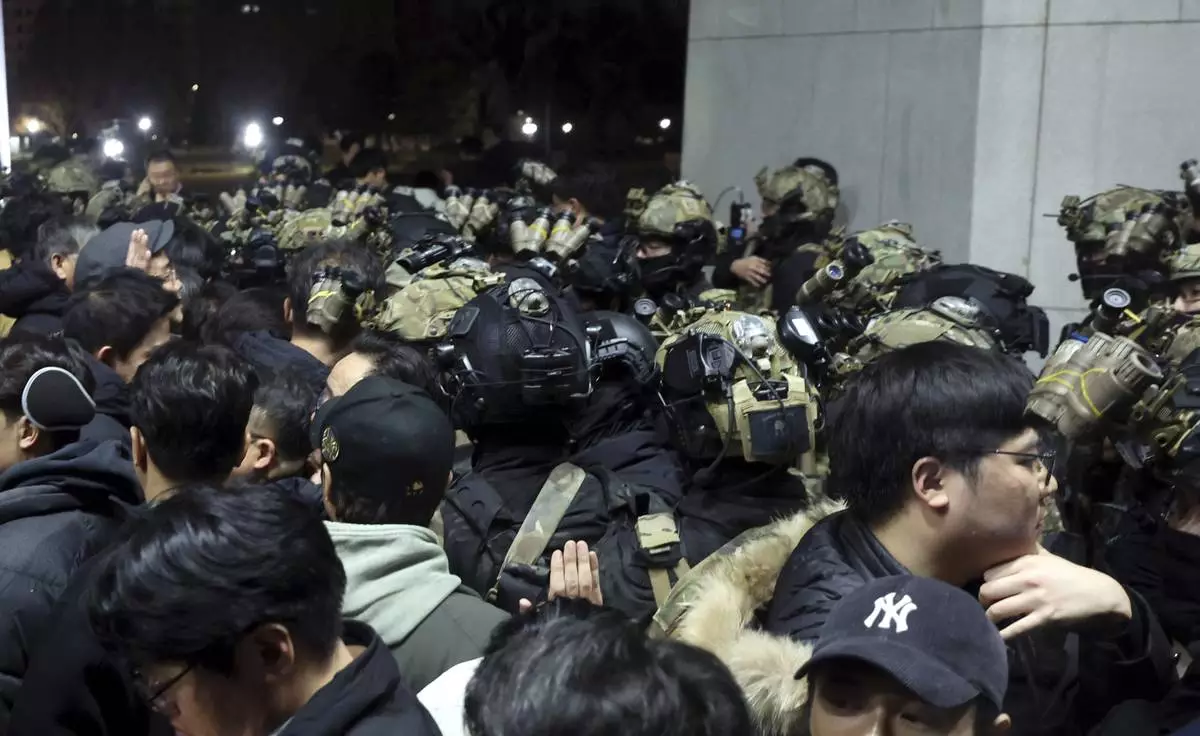
South Korean martial law soldiers try to enter the National Assembly compound in Seoul, South Korea, Wednesday, Dec. 4, 2024. (Cho Sung-bong/Newsis via AP)
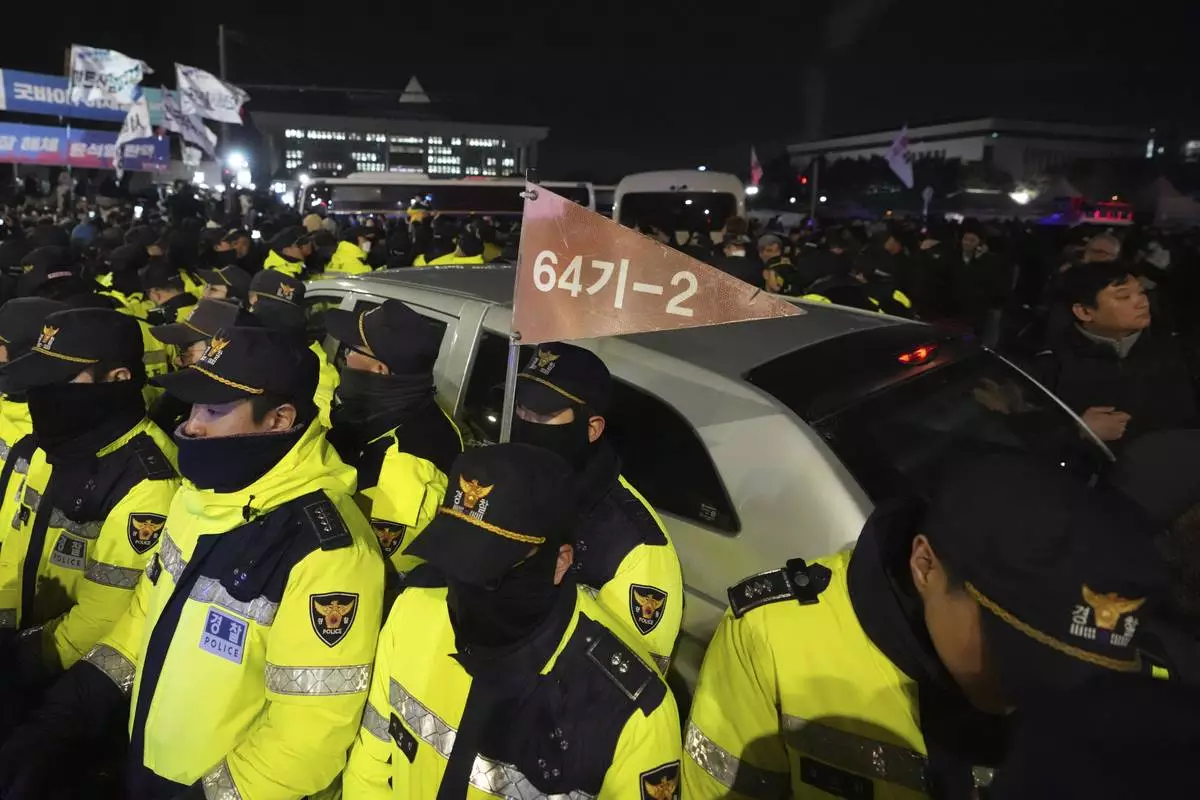
Police officers stand outside the National Assembly in Seoul, South Korea, Wednesday, Dec. 4, 2024. (AP Photo/Lee Jin-man)



